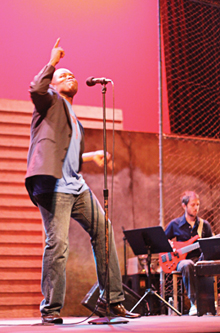Storytelling With a Beat
By Clarissa Sansone
Photography by Christian Pollack

When Glynn Washington, '96, received his acceptance letter to Michigan Law, he was in Japan, just out of the shower, and wearing a towel, which, in the midst of his exuberance, fell to the floor—in front of the postman who had delivered the good news…. That's the way Washington tells it, anyway, and if there's one thing he knows how to do, it's tell an engaging story.
In 2007, Washington—then the director of The Center for Young Entrepreneurs at UC Berkeley's Haas School of Business—had the opportunity to put his storytelling skills to the test. Ever a fan of public radio, Washington lamented the suburbanized, sterilized direction in which he thought the medium had been heading. "I wanted to preserve my right to complain," Washington says, so, to put some substance behind his words, when he heard about the Public Radio Talent Quest, he entered. With typical dramatic tension: Washington heard about the contest the day before the submission deadline, and stayed up all night, using Garage Band software to put together a two-minute submission.
More than three years, a few elimination rounds, and one pilot later, Snap Judgment premiered on public radio in the summer of 2010. Additionally, Washington launched a series of Snap Judgment television specials.
"Storytelling with a beat" is how Snap Judgment defines itself. "Our show is infused with a hip-hop sensibility," says Washington. The "beat," though, doesn't only refer to the program's pervasive musical accompaniment, but to the cadence and rhythm of a tale told well. And eloquently. "The show is very fast," notes Washington; it features "upwards of nine" stories per hour. "This is the Internet generation," Washington explains. "Forget the exposition. Get me to the story quickly and stop wasting my time."
A quick retelling of Washington's own colorful story, however, only skims the surface. Born in Detroit, Washington moved with his family to the countryside when he was still young. While there, the family joined an apocalyptic cult. While not a pleasant experience—in college Washington jumped at the chance to go to Japan "to clear my head" from the effects of doomsday preachers—being a member of The Worldwide Church of God nevertheless influenced his storytelling skills. "I studied at the feet of amazing charlatans," he remarks. "It was a storytelling seminar of the highest order."
Following college (Washington earned his bachelor's degree in 1992, in addition to his 1996 JD, at U-M), he returned to Asia and did community development work. "I went to law school," he explains, "as a tool to advance my nonprofit career. I've been running nonprofits since graduating from law school."
His legal education and his storyteller's gift both have served him professionally. "How you actually move policy is by getting people to understand the story you're telling," he says, "trying to get people to put themselves in someone else's shoes." And his law degree is a valuable tool in his current storytelling mission. "Being a host and telling a story is the very least of what I have to do. This is a start-up," Washington says of Snap Judgment. He appreciates his "ability to analyze extraordinary amounts of information quickly," which he learned at Michigan Law, and considers his law degree "probably more helpful than anything else" in "making sure this organization is sound."
"One thing I took away from law school is that whoever tells the best story wins. A legal education is, in many ways, a storytelling education. You have to put your facts together in a way that is more compelling than the other guy."
As with Washington's nonprofit work, Snap Judgment also "tries to put somebody in someone else's shoes." And it isn't as effortless as Washington makes it sound on his quick-paced show. "Writing's hard," he says simply. "Really good stories are crafted. It's a very painful and deliberate process, but it's got to sound like you just thought it up." He adds, "I see storytelling as a type of alchemy," with its ability to transport people to places they'd never go otherwise.
He gets practice every night, though, telling stories to daughter Bahia, 7, and son Quincy, 4. "They are the hardest core audience of all. Every night, they want a brand new story. It's been tremendously helpful to my storytelling," Washington says, and "if they don't dig it, they let me know in a hurry."